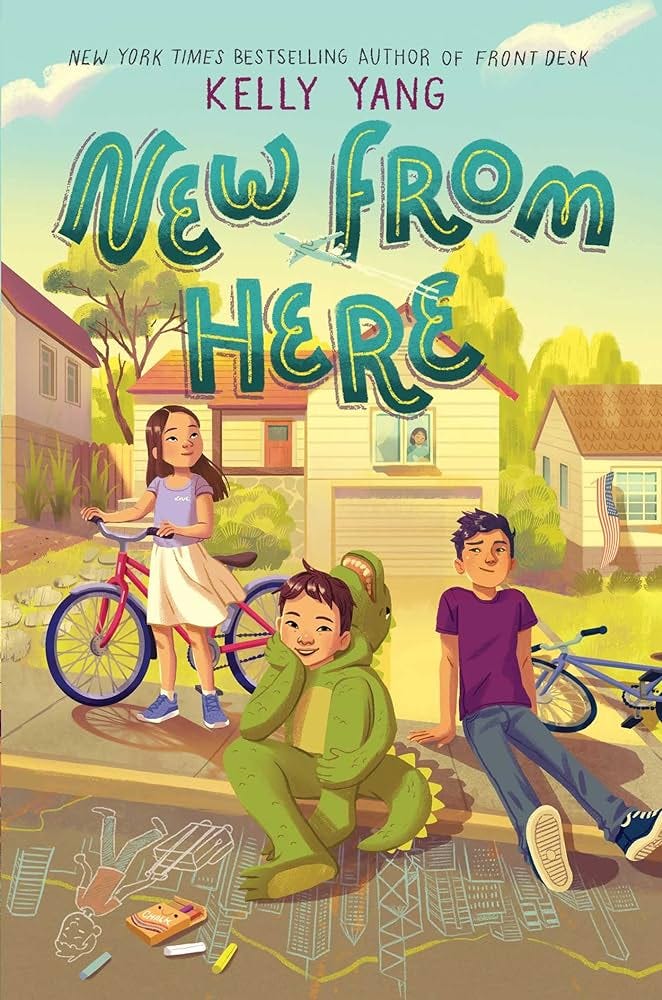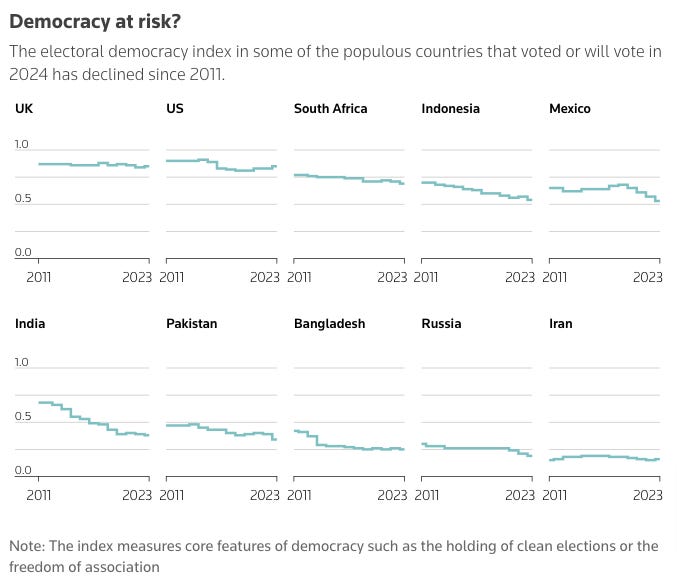This week…
Your reading time is about 6 minutes. Let’s start.
IYKYK. Cue the bad take think pieces in three, two, one…
There are memes, disinformation, conspiracy theories, internet sleuthing (and getting the wrong person), and that’s just on the bad new XTwitter. Doesn’t it make you miss the good old Twitter? Do we want to check TikTok or do we want to do a mental health check at this point?
Anyway, here’s a selection of top stories on my radar, a few personal recommendations, and the chart of the week.
ICYMI: The Previous Block was about the election Super Bowl week, a few not-so-cool apps, and AI in sports (and everywhere, really). FWIW:
Novak Djokovic, Elon Musk and others should grasp this: fame and public affection are not the same thing by Mark Borkowski for The Guardian.
Could Hungarian PM Viktor Orbán face consequences for his diplomatic world tour? by Aleksandar Brezar for Euronews.
I feel betrayed by the West: Iran’s freedom protesters react to their new president by Deepa Parent for The Guardian.
CORRECTION NOTICE: None notified. TRAPPED
Scammed by the fake Chinese police
Elaine Chong and Ed Main for BBC:
Helen Young still has nightmares about the fortnight that she was made to believe she was on China’s most wanted list.
Scammers posing as Chinese police manipulated the London-based accountant into believing she was under investigation for a massive fraud back in her homeland.
Helen was presented with a mountain of fabricated evidence which appeared to implicate her in a crime she knew nothing about.
When the fake police then threatened her with extradition to a jail cell in China, Helen sent them her £29,000 life savings as “bail money”, in a desperate attempt to stay in Britain.
“I feel a bit stupid right now,” she says. “But there’s no chance I can know that's not real. It's so convincing”.
Helen’s story may sound extraordinary but there have been numerous similar cases in the Chinese diaspora.
What happens when you are taught total obedience? Loosely linked:
Students at fake Michigan university set up by ICE can sue, court rules by Sara Powers for CBS.
Conservative evangelicals use social media to sway Brazil election by Matheus Andrade and Daniela Dib for Rest of World.
The $11 billion marketplace enabling the crypto scam economy by Andy Greenberg and Lily Hay Newman for Wired. (Archive link.)
F(AI)ME
The Chilean AI artist who used Bad Bunny’s voice — and shot to fame
Charis McGowan for Rest of World :
When Mauricio Bustos, 30, created the song “NostalgIA” in his humble apartment in downtown Santiago, he never expected that the Puerto Rican reggaeton and trap superstar Bad Bunny would actually pay it any mind. It was October 2023 and Bustos was publishing tracks on his YouTube channel, where he’d developed a modest fanbase that supported his career as an unsigned artist.
But “NostalgIA” hit different, and exploded on social media. Within a month, the song had struck viral gold, racking up half a million TikTok views and nearly a million Spotify streams. It even made it to the top 20 of Spain’s Spotify streaming charts.
For fans of the Latin Urban genre, the song was a dream collaboration: Justin Bieber sings the chorus in fluent Spanish, while Bad Bunny raps alongside retired old-school legend Daddy Yankee.
Sounds like an unlikely supergroup? You bet. Loosely linked:
Meet Kenza Layli from Morocco - the winner of the world's first Miss AI beauty pageant by David Mouriquand for Euronews.
TUAW, a beloved tech blog now publishes AI articles under the names of its old human staff by Jason Koebler for 404 Media.
US disrupts Russian government-backed disinformation campaign that relied on AI technology by Eric Tucker for AP.
SCIENCE
When scientific citations go rogue: Uncovering sneaked references
Lonni Besançon (Linköping University) and Guillaume Cabanac (Institut de Recherche en Informatique de Toulouse) for The Conversation:
Reading and writing articles published in academic journals and presented at conferences is a central part of being a researcher. When researchers write a scholarly article, they must cite the work of peers to provide context, detail sources of inspiration and explain differences in approaches and results. A positive citation by other researchers is a key measure of visibility for a researcher’s own work.
But what happens when this citation system is manipulated? A recent Journal of the Association for Information Science and Technology article by our team of academic sleuths—which includes information scientists, a computer scientist and a mathematician—has revealed an insidious method to artificially inflate citation counts through metadata manipulations: sneaked references.
Publish or perish, am I right? Loosely linked:
Dengue: A virus by any other name – why scientists are renaming viruses by Sarah Pitt for BBC.
TikTok is full of bad health “hacks.” Here’s how to navigate them by Keren Landman, MD for Vox.
Peer review is essential for science. Unfortunately, it’s broken (excerpted from the book Rescuing Science: Restoring Trust In a Digital Age) by Paul Sutter for Ars Technica.
Other curious links, including en español et français

LONG READ | The battle for Leslieville: Gentrification, opioids and murder in the city's most divided neighbourhood by Navneet Alang for Toronto Life.
INFOGRAPHIC | How this year of elections is set to reshape global politics by Mark John and Sumanta Sen for Reuters.
She defrauded apps like Uber and Instacart of hundreds of thousands of dollars. Meet Priscilla, Queen of the Rideshare Mafia by Lauren Smiley for Wired. (Archive link.)
What will get the U.S. interested in international news? by Elizabeth Djinis for Poynter.
When government bureaucracy fails them, a collective of Indigenous migrants figure it out themselves by Chantal Flores for The Markup.
Eurocopa 2024: El seleccionador alemán pide inteligencia artificial para evitar otra mano, de dios o de Cucurella por Luis de la Fuente Valentín (Universidad Internacional de La Rioja) en The Conversation.
Las adolescentes que dejaron de compartir ‘stickers’ para proteger su mente de la barbarie por Ana Torres Menárguez en El País.
El tabaco corteja a las mujeres jóvenes con marketing encubierto: el resurgir del cigarrillo entre ‘influencers’ y famosos por Brenda Otero en El País.
Législatives 2024 : chez les influenceurs, la gauche respire, l’extrême droite fulmine par Morgane Tual dans Le Monde.
Innovation ou pur gadget, que sont ces taxis volants qui seront expérimentés à Paris pendant les JO ? par Sascha Garcia dans Libé.
Il y a une majorité verte par Pierre Charbonnier et Camille Roussac dans Le Grand Continent.
What I read, listen, and watch
I’m reading New From Here (2022) by Kelly Yang about anti-Asian hate during the COVID-19 pandemic. It’s a “middle-grade novel” but it’s cute and sad at the same time and I think adult readers, when they escape real life through the fictional media they consume, should sometimes enter the minds of little kids, because sometimes we forget, and we lose a bit of our humanity as a result.
I’m listening to Ed Zitron on Better Offline talk about how shareholders are destroying the tech industry.
I’m watching Al Jazeera’s The Listening Post on how the incoming left-wing coalition in France will have to navigate a hostile media environment.
Chart of the week
From the Reuters infographic piece in the section above, the authors stated that pro-democracy watchdogs estimate that nearly three-quarters of the world's population live in autocracies. Overall, there is a decline in the electoral democracy index in some of the populous countries that voted or will vote in 2024 since 2011.





Oh, I know...and it's scary.